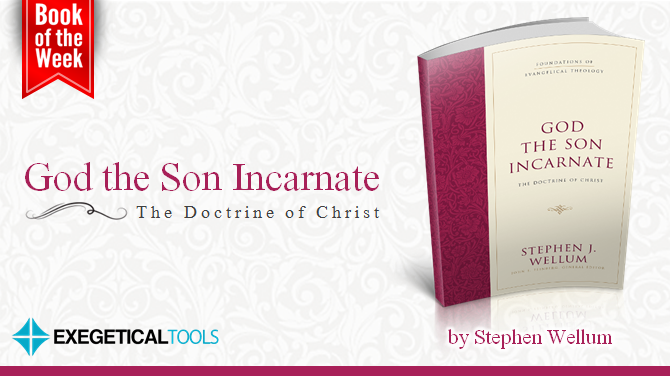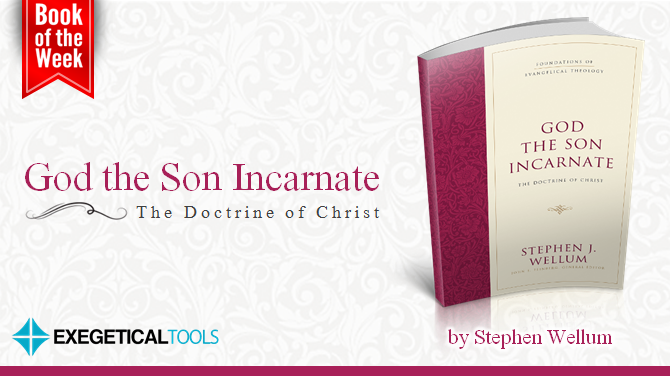
At the center of biblical and systematic theology is the doctrine of Christ. The early church hammered it out with treatises, councils, and creeds. Moderns have hammered it out with philosophical and theological developments. Christology is ever-developing, although one wonders whether any significant alterations to traditional Christology have been made in the modern period.
Given these continual developments, we need works that can survey and critique newer views, while also remaining conversant with traditional views. That is exactly what you will find in Stephen Wellum’s new God the Son Incarnate: The Doctrine of Christ. The book is a truly magnificent textbook on Christology.
The book argues for one thesis: Jesus Christ is God the Son incarnate. While he makes the positive argument in several sections, he also plans the book in four parts to guard against any potential objections to his thesis. The first part provides epistemological warrant. Wellum skillfully glides through the rise of historical criticism and its influence on Christology, particularly the historical Jesus movements. He argues that we must use “revelation from above” to learn how Christ is, which means taking Scripture as authoritative and true.
Part 2 provides biblical warrant for his thesis. He builds on his co-authored Kingdom through Covenant to show how Christ fits into the covenantal structure of Israel’s faith, demonstrates from Scripture that Jesus knew himself to be divine, and surveys some significant NT passages for Christology to show that they taught the same (Rom 1:3-4; Phil 2:5-11; Col 1:15-20; Heb 1:1-4). Wellum also surveys other biblical data that virtually prove (despite the arguments of some NT scholars) that Scripture presents Jesus as the divine Son of God. These data include Jesus’ divine attributes, his works, his titles, and the several passages that refer to Jesus as θεός. Wellum also explores exactly how Jesus was human according to the Scriptures–a theme foreshadowing important historical debates he discusses in part 3.
The third part is a treasure for biblical scholars. Wellum summarizes the important Christological controversies in the first centuries of the church, including the ante-Nicene controversies, Nicea, Chalcedon, and post-Chalcedonian developments. This section was a delight to read as it brought back memories of church history class when I first learned about the councils and their Christological conclusions. This part provides Wellum’s thesis “ecclesiological warrant”–that is, his thesis has solid grounding in what the church has consistently taught.
The final part provides warrant by defending his thesis against modern variants of orthodox Christology (particularly two brands of kenoticism) and against charges such as incoherence. He also weighs in on his own positions on issues such as Christ’s natures, his wills, etc.
Wellum not only argues that Jesus Christ is God the Son Incarnate, but has shaped an intentional and methodical work to defend that thesis. His work ultimately echoes traditional Christology, but a textbook that simply laid out the biblical evidence and concluded with the same thesis would have been vulnerable to multiple objections, at least to the objection of ignoring all the contrary factors that work against traditional Christology. By the time I finished the book, I was able to see how the four sections fit together and was impressed by the carefully constructed and fortified argument.
Stephen Wellum methodically and forcefully defends his thesis that Jesus Christ is God the Son Incarnate Share on XAnother aspect I appreciated was Wellum’s use of both biblical and systematic theology to expound his Christology. He made me feel quite at home when rolling through Christ’s divine attributes (a la Bauckham) and the Christ as θεός passages. But he also rekindled my love for history and reminded me of my need to continue studying the Fathers and the history of the councils. The comprehensiveness of this volume is one of its most praiseworthy elements.
If there’s any room to complain, it might be that those of us in certain disciplines might wish that Wellum had included more from our field and less from others! For example, his survey of the apostolic proclamation included only four passages (although certainly four of the most important ones), and I was left wanting more. But I quickly forgave him in light of the size of the book and the overall scope of what he was trying to accomplish.
I highly recommend this book to laymen, students, pastors, and even some scholars as the most thoughtful and successfully executed survey of Christology that I know of.
Preview or buy it here on Amazon.


